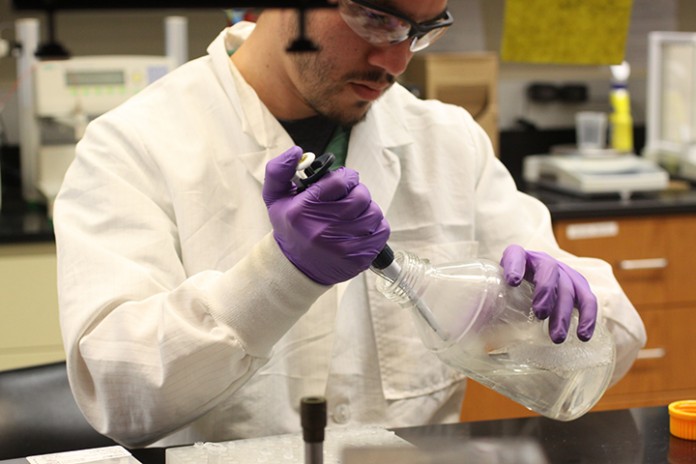By Jessica Babb Lariat Broadcast Editor
Behind the closed doors of the Baylor Sciences Building, biochemistry associate professor Dr. Michael Trakselis and his students are researching the building blocks of life.
“Research is intellectually challenging, but having students work with you and get excited about the project, to me its great,” Trakselis said. “It’s really fun and just to see the light click on sometimes or just to get that great result for them. It’s exciting and it’s great to see that excitement.”
Trakselis’ research focuses primarily on mechanisms of DNA repair and replication to learn how enzymes work on DNA to copy it, fix it, and unwind it. By understanding how certain enzymes interact with each other, Trakselis hopes to be able to contribute to cancer research and infertility therapeutics.
“If you’re real lucky you can see it in your lifetime, but most people don’t,” Trakselis said. “That chance in developing drugs is always the goal but cancer is so complicated, we can do it for certain things but we can’t do it for everything. So we can use some of what we’ve learned for diagnostics.”
Trakselis has always been fascinated by DNA because of the complexity of the structure, but didn’t realize until graduate school that he wanted to research it.
“Having some health impact was important for me,” Trakselis said. “Studying a relevant disease is challenging, but then to use some chemistry, some quantification, number to put on a biological problem, that’s what drove me to that.”
However, Trakselis isn’t just helping people through his research. He constantly helps the undergraduate and graduate students in his lab learn many life lessons.
“It would be nice to have some of our research make an impact toward the development of drugs and it would be nice to see some of our fundamental discoveries show up in in textbooks,” Trakselis said. “It’s actually starting to happen which is nice just to make an impact in science. I would also like to see my students succeed in their own careers, I think that’s pretty rewarding as well.”
Wentzville, Mo. senior Carly Thaxton, is one of the undergraduate students currently working with Trakselis. Thaxton focuses most of her time working with DNA helicases, which is the protein that unwinds DNA, where she introduces mutations into the amino acids to see how they react.
For almost a year now, she has been working to prepare herself for medical school next year. Through her experiences with the research, she has been forced to overcome many obstacles.
“When you are in science labs, you have the protocol written out and it’s supposed to work like that,” Thaxton said. “For us we are doing research on something people haven’t done before so we have to write the protocol and perfect it.”
While Thaxton is excited about the research, she recognized how frustrating it is when an experiment doesn’t go as planned and she has to repeat the process numerous times.
“You don’t have to be a genius to do research, you just have to be persistent,” Thaxton said.
However, despite the challenges, Thaxton said he appreciates having a mentor to guide her through the process.
“I can approach him about anything at all honestly,” Thaxton said. “If I have a problem I’m not afraid to ask him, if I mess something up, I’m not afraid to tell him. He’s definitely willing and open to help.”
Round Rock graduate student Matthew Cranford, who is researching different interactions between enzymes, also said how much he appreciates having a mentor like Trakselis to guide him through his research and future career aspirations.
“He is great to work with and I know he really wants us to be successful,” Cranford said. “Ever since I met him I knew he was going to give me what I needed to be successful and I’ve always enjoyed working with him.”
Trakselis said one of his favorite things about research is when his students learn how to persist through the challenges.
“The most rewarding part is when you get that great result and you are working together with your students because usually it’s a long journey and its fun when you get to that end goal,” Trakselis said. “There are lots of down along the way, and then finally there is a great discovery and that’s what is exciting.”
However, aside from the research, the real impact from the time spent in the lab doesn’t just come from the discoveries in DNA, but the people who work closely with it together.
“My favorite part is the people who are part of the lab. They are just very easy to get along with and we just enjoy each other’s company,” Cranford said. “Its nice to work with people who are fun and also challenge you.






